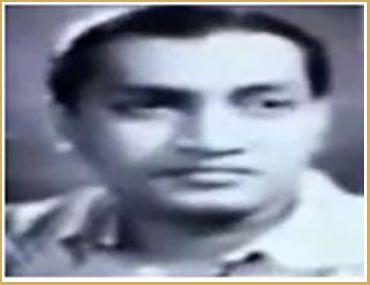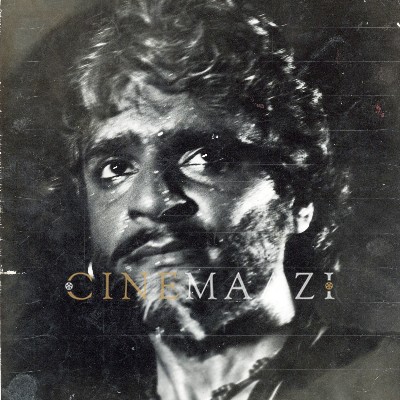Gyan Dutt

Subscribe to read full article
This section is for paid subscribers only. Our subscription is only $37/- for one full year.
You get unlimited access to all paid section and features on the website with this subscription.
Not ready for a full subscription?
You can access this article for $2 , and have it saved to your account for one year.
- Real Name: Janan Dutt
- Died: 3 December, 1974
- Primary Cinema: Hindi
A prominent music director during the formative years of the Hindi cinema, mainly the 1940s, Gyan Dutt is known for films such as Toofani Toli (1937), Chandulal Shah’s Achhut (1939), his biggest hit Bhakt Surdas (1942), Adab Arz (1943), and Dilruba (1950). In his heydays, his music was known to virtually guarantee a hit film. Associated with Ranjit Movietone till 1940, he composed for approximately 59 films in the course of his career. He also sang some of his self-composed songs such as Are beraham kainchi kyun chalata hai, and Chhal bal karke chitwan bharke. Despite being later side-lined in the evolving landscape of the music industry, he is still considered a strong musical icon with enduring appeal.
Born in Bangalore into a family hailing from Bengal, he was named Janan Dutt. Later, he was advised by friends and well-wishers to change his name to the more polished-sounding Gyan Dutt. This was the name he went on to adopt and score music under. He made his debut as a music composer with Ranjit Movietone’s Toofani Toli in 1937. He scored a masterpiece composition for the film - Kyun naino se neer bahayein which was rendered by Wahidan Bai. The film was directed by Jayant Desai, and the two would go on to collaborate on several films. He did 11 films for Ranjit Movietone between 1938 and 1939, scoring music across genres such as social, costume drama, stunt, and mythological.
In 1939, he was offered the opportunity by Sudama Productions to score music for the film Aap Ki Marzi (1939). Starring Savita Devi, Motilal, Khursheed and Wahidan, the film was directed by the successful director, Sarvottam Badami. The film also saw Gyan Dutt rendering three solos himself, namely Kaun bataye kya hai raaz-e-zindgi, Gayein chara ke banke bihari and Premlata lipti jaye daron se, the latter two being duets with Khursheed and Savita Devi. The same year he composed music for Sant Tulsi Das (1939), which was also well-received. The film’s songs Ban chale ram raghu rai and Ram se koi mile de became particularly successful.
Gyan Dutt also scored the music for the Chandulal Shah directorial Achhut (1939). Starring Motilal and Gauhar in the lead roles, the film was made with the blessings of Mahatma Gandhi. A social based on untouchability, it promoted Gandhi's movement against the social evil. The third highest grossing Indian film of the year, it contained the stirring musical compositions such as Di dukhi ko daan diya, Koi bajaye na prem ki veena, and Nahi bolu nahi bolu. Raghupati raghav raja ram which was known to be Gandhi's favourite bhajan was also included in the film.
He went on to compose the music for Ranjit productions Musafir (1940) which was a social directed by Chaturbhuj Doshi, and Sajani (1940) which were also appreciated. The Jayant Desai directorial Beti (1941) included popular numbers by Dutt’s favourite singer Khursheed, such as Ghir ghir ghan mein ghor ghata chhaiye, Armaan kuch to dil mein tadap ke hi rah gaye and Naino se nain milake nayari chhabi dikhla ke. The following year he scored the music for Aankh Micholi (1942) with singer-actress Nalini Jaywant in the lead; she sang under his baton for the film. He himself rendered four solos, namely Jag mein kiska prem bada hai, Ae re maiye maiye re mere babul se, Dekho ji na cheedo and Main toh bade baap ki beti re.
However, it was in 1942 that he delivered his career’s biggest hit - Bhakt Surdas. Belonging to the devotional genre, it was the third highest grossing Indian film of the year. Directed by Chaturbhuj Doshi for Ranjit Studios, it was singing-acting sensation K L Saigal's first film after his move to Bombay from Calcutta. Gyan Dutt composed no less than 15 songs for the film, most of which became major hits. The film saw Saigal delivering some of his best songs such as Nis din barshat nain hamare, Nain heen ko raah dikha prabhu and Maiya mori mai nahi makhan khayo, as well as the duets Chandni raat aour tare khile ho, Jis jogi ko jog liya, and Sar pe kadam ki chhaiyan muraliya baaj rahi. The songs were hailed as immortal and unforgettable. The same year, he scored the music for Arman, Return of Toofan Mail, Savera and Dhiraj.
The following year, he composed the music for Adab Arz (1943) starring Nalini Jaywant, Karan Dewan and singer Mukesh, who also acted in the film. Jaywant rendered the compositions Haryala banna ho bhai matwala bana and Kehta hai ye dil baar baar. Adab Arz was followed with Insaan (1944), Chamiya (1945), Ghazal (1945) and Bansari (1943). Nurse (1943) was yet another hit from Dutt in the same year. Starring Khursheed and Arun, it included the Khursheed-rendered Koliya khahe bole re, Kahani ban gai mori, Mere dil ki suno pukar and Aankhon ka kheel kheel ke.
The changing times brought new talents to the fore and the arrival of music directors like C Ramchandra, Naushad and S D Burman saw a decrease in the quantity of work coming Dutt’s way. That being said, he still retained his magical touch. His music for Panna Dai (1945) included two ghazals rendered by Begum Akhtar, Fasl-e-gul aayi and Main raja ko apne rijha ke rahungi. The album also included the Khan Mastana song Main to charan kamal per wari. The year 1946 saw him compose music for Dulha and Kamla, while the following year he gave music for Geet Govind (1947), based on the work of poet Jaidev. His music for Dukhiyari (1948) saw Lata Mangeshkar render one of her most popular songs - Ab kisko sunao main katha krishna murari. Incidentally, this was the only song sung by Mangeshkar for Gyan Dutt. He had yet another musical hit with Sunhare Din (1949), starring Raj Kapoor, Rehana and Nigar. It included the immensely popular songs such as Baharon ne jise chheda hai, Dil do naino mein kho gaya and Maine dekhi jag ki reet meet sab jhoothe pad gaye. He worked on the film Dilruba in the year 1950, the songs of which were also widely appreciated. Starring Rehana, Dev Anand and Yakoob, the film boasted of a great music album including songs such as, Hamne khayee hai mohabbat mein jawani ki kasam, Fariyad ko lab per and O preet nibhane wale bata.
By the 1950s there was a distinctly visible slump in Dutt’s career, with work becoming scarce. He nonetheless kept working and making music which was appreciated in films like Ghayal (1951) and more. The songs Aaj hamein lage chand payara, Dil toot gaya and Armaan mere dil ke made their mark, as did the Mirza Ghalib ghazal Hazaron khawaishen aisi, composed in a Pahari based tune, which became extremely popular. Few of his last films as the music composer were Daryai Lutera (1952) and Gul-e-Bakawali (1956). The latter of which had Asha Bhosle sing Gyan Dutt’s music compositions for the first time. He retired from the film industry after the 1965 film Janam Janam Ke Saathi.
Gyan Dutt passed away on 3 December, 1974, leaving behind several evergreen melodies from a time long gone.










.jpg)



